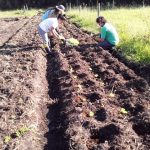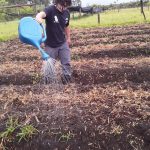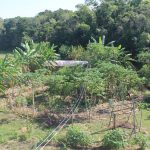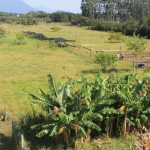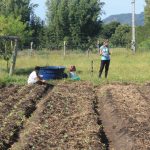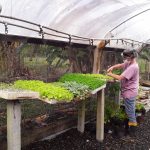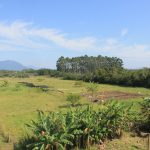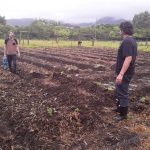
UFSC Ressacada Experimental Farm. Photo: Councilman “Marquito” and Edaciano Leandro Losch.
During and after the new coronavirus pandemic, social inequality in Brazil tends to increase dramatically. At this juncture, it is essential to look for alternatives and ways of producing and providing healthy and quality food, especially to the most vulnerable social groups.
The outreach project titled “Production of agroecological food for socially vulnerable families in Florianópolis, Santa Catarina: food security in times of COVID-19 pandemic” was born from an unprecedented partnership between the Agroecology Research and Outreach Center of the Ressacada Experimental Farm (FER) at Universidade Federal de Santa Catarina (UFSC), the Florianópolis City Council – through the office of the councilman Marcos José de Abreu (“Marquito”) – and the civil society organizations Marmitas Veganas [Vegan Lunch Boxes], Campeche Solidário (Solidary Campeche), International Society of Krishna Consciousness (ISKCON South Brazil), Compassos Institute, Community Garden of Campeche Cultural Park (Pacuca), C0vid-19 Floripa and Grupo Comida e Vida Alegre [Happy Life and Food Group]. The meals and food baskets prepared in the project will benefit poor residents of Florianópolis and the surrounding area, as well as UFSC students and employees.
The initiative aims to strengthen existing solidarity campaigns focused on food collection. Faculty, students and staff from UFSC and external volunteers are participating in the project, which is coordinated by Patrizia Ana Bricarello, a professor in the Department of Animal Sciences and Rural Development (ZOT) at the School of Agricultural Sciences (CCA).
Methodology
The project aims to go beyond the collection and distribution of food: it aims to help building the agri-food autonomy of the segments involved. The planting of vegetables will take place in the Agroecology Research and Extension Center at the Ressacada Farm, from April to December 2020. Seedbeds of 20×1.2m each will be prepared in an initial area of 600m² (in Tapera neighborhood, Florianópolis), which can be expanded to double the size depending on the demand for food and the availability of labor.
The beds will firstly receive a fraction of limestone and will be fertilized with poultry litter and cattle and sheep manure. Afterwards, the seedlings will be planted according to the Biodynamic Calendar that governs the favorable and unfavorable days for planting flowers, fruits, leaves and seeds, as well as for pruning, grafting and harvesting.
The seedlings will be made available through the support network and solidarity campaigns that are part of the project, with the mediation of the councilman Marcos José de Abreu and his assistants, as well as with the help of volunteers who will assist in the operational tasks and in taking care of the plants.
During the autumn/winter period, vegetable species will be planted: broccoli, cauliflower, kale, beet, carrot, and herbs. Whereas in the spring/summer, annual crops such as sweet potatoes, cassava, corn, yams, leafy vegetables, among others, will be planted.
The crops will be planted with spacing according to literature recommendations, in an intercropping and alternation scheme, so that every week there is a species to be harvested. During crop development, biodynamic preparations and homeopathic and herbal medicines will be applied for the control of insects and pathogens. Chemical fertilizers and pesticides will not be used.
Donation
The food produced will be directed to solidarity campaigns. Some items will be delivered fresh and others will be processed in community kitchens to be delivered in the form of lunch boxes and meals to the target audience.
Translated by SINTER.
Read the original article here.






